NGS Students Address Global Issues at 2020 Science and Engineering Fair
Febuary 24, 2020
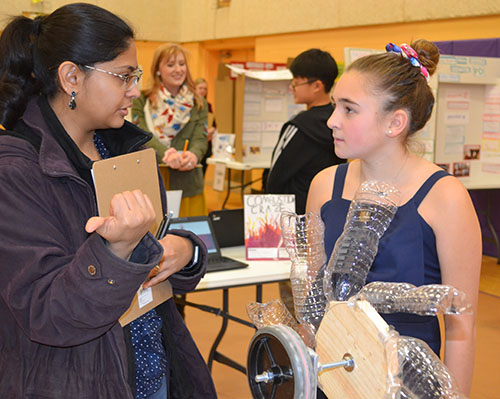
A Department of Cell and Developmental Biology graduate student Janhavi Kolhe interacts with an NGS student about her project.
This year, for the Next Generation School (NGS) annual Science and Engineering Fair, the organizers made a slight change. Rather than students choosing to research any area as long as it was related to science or engineering, their projects were to address global issues. “We always want to keep things new and fresh for our children,” admits Head of School Chris Woller, “because we feel like that's also the world of science and engineering—new things are always popping up.”
Regarding the new emphasis, she adds: “So we want to make sure that they're remaining engaged and that it doesn't feel for them like, ‘Oh, here's the fair again.’”
The new emphasis comes on the heels of last year’s big change for for the Primary A (kindergarten) through middle school students (all but the very youngest), when, instead of reporting research findings on a huge poster, they created websites, which they also did again this year.
“It was fun to watch them tackle this,” explains Woller regarding the global issues emphasis. For one, the students had a bit of a paradigm shift compared to how they’d done the fair for the last couple of years. “To watch them go through the process of changing their thought process on how to pick a topic, and what they wanted to address, and watching the conversations that they had as they were going through the process, that was also really cool.” She adds that students were getting feedback from each other to make sure they weren't picking something that somebody else was doing, and also forming groups or teams based on similar interests.
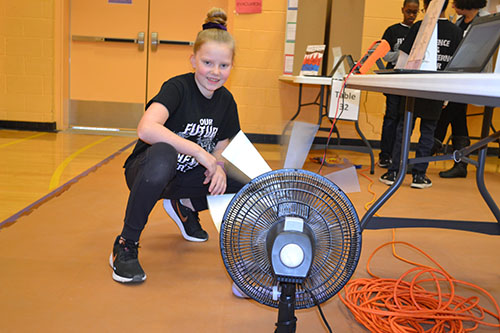
A Next Generation School student demonstrates the prototype she designed and built for her project about wind turbines.
Another reason students embraced the new topic with gusto, according to Woller, is because NGS students are “so civic minded.” Indicating that while some of students’ concern for the environment and humanity as a whole comes from their families, she adds that, “It comes from messages that we give them here at school about their purpose in life, and how they have this ability to impact the world. Seeing how they grasp that too…it almost intensified their commitment to their project because they felt like this was something that they can give back, that they might come up with an idea or a concept or something that is going to help others.”
Claiming that the switch to the global issue emphasis had been really exciting, NGS primary science teacher Stacie Nakamura stresses that the school’s goal was to emphasize students relating their science fair project to the real world. “How can they make these connections to just seeing how their projects can help address these global issues? Obviously, they can't solve it in four weeks,” she admits, but regarding the global issue students were looking at, the goal was to "help them relate science and engineering to real-world connections,.”
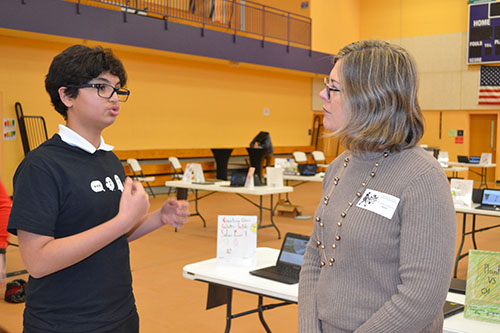
Psychology Professor Kara Federmeier listens as an NGS students presents his research project.
Nakamura adds that her favorite thing about the science and engineering fair was the students' excitement and anticipation about the day. “I've had so many students coming up this week just saying, ‘Science fair’s coming up! Science fair’s coming up!’ So for it to finally be here, I think, is really exciting.” She also enjoyed “seeing the passion in students of being able to share about their projects and everything that they've learned from it.”
A key component of the fair, for the students, was presenting their research to guest experts. Many of these were University of Illinois researchers. For instance, Kara Federmeier, a Psychology Professor, is a regular at the fair. She says she keeps coming back year after year because of what she gets out of it. “Every year, it renews my enthusiasm for science because the kids are just so excited about what they're doing. And you know, they do interesting things. And it reminds me sort of how I felt when I was a kid, and why I wanted to be a scientist.” (Plus, she has kids at the school; however, she can’t be guest expert for her own kids..it's school policy.)
Professor Carla Caceres, from Evolution, Ecology and Behavior in the school of Integrative Biology, keeps coming back, “Because it's so exciting to talk to these kids about what they've been doing, and they're very passionate about their projects, and it's a lot of fun to talk to them and hear what they're thinking.” She also enjoyed “hearing about what they think are the big global issues that they're really growing up with.”
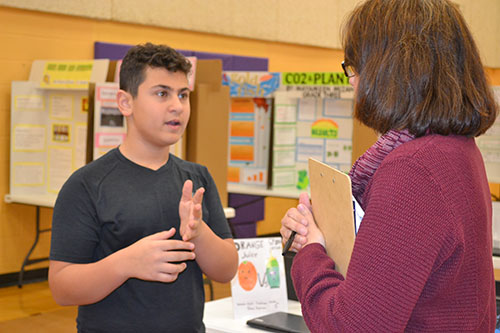
An NGS student shares his research with a community expert.
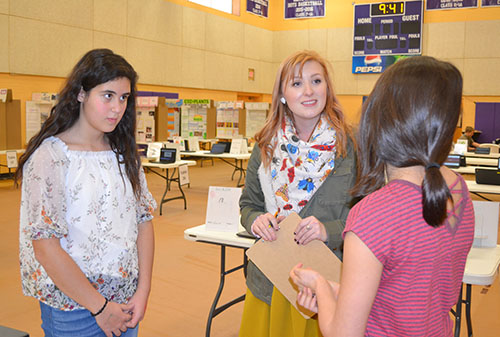 Taylor Braastad (center) listens as two NGS students present their research.
Taylor Braastad (center) listens as two NGS students present their research.In her first year as an expert, Associate Professor Wendy Yang from the Department of Plant Biology and Geology shares why she was excited to participate in the fair,
“It's really amazing for me to see how engaged the students are with these global issues and their ability to carry out the scientific and engineering projects. And it's really nice to come here as opposed to just going to the fair when it's open because we have more time to talk to the students in depth. To see their confidence and their ability to describe the work that they've done shows that they really understand why they've done the project and what it means.”
Also serving as guest experts were several Next Generation educators, including Taylor Braastad, the science teacher and outreach coordinator over at Next Generation's Preschool across the street. This was her first year to experience the fair, and she admits that when she was invited to be a guest judge, her motivation wasn’t solely to promote STEM.
“I was so excited to see how some of the students I taught when they were three and five years old have grown,” she admits, “how they've continued to grow with their scientific process, and how they've taken what we start over there. It's like a teeny tiny seed of an idea and how they grow with it.”
Plus, she hoped to experience the fair for herself. “I also really wanted to see the whole event,” she acknowledges. “I've never seen those websites the students have created before. I wanted to see how they took an idea like this fantastic presentation about dirty water testing and what kind of global issues are important to kids now. They have a really good sense of what's going on in the world, it seems, and what's important, and what we need to change moving forward.”
While she knew maybe 30% of the older kids, she reports, “But in a little bit, when I go to primary A (kindergarten) and B (1st grade), it's 100%. I'm excited!”
Regarding how the fair benefits students, Braastad reports: “I think it's fantastic to get feedback from people who are working in the industry, especially some of our guests experts today. But also getting the chance to explain what you've worked on to an adult is always a beneficial process, I think, to work on your oral communication and presentation skills and also to think about your project on a big scale.”
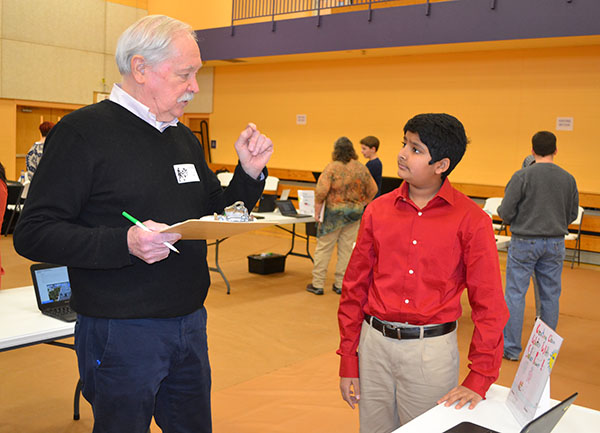
Bill Rose of Illinois' Applied Research Institute (left) discusses with an NGS student his research,"Creating Clean Water with Solar Power."
Plus, Braastad hopes that for the kids, it’s more than just another assignment. “So not just getting the grade,” she admits, “but what is it that we're actually working on here? What are we trying to learn? What do we want to change?”
So is serving as a guest expert to judge some of her former students, kids she’s poured herself into, a conflict of interest for her? “I might be a little biased,” she admits, laughing.
While NGS’ Science and Engineering Fair is a whole lot of work, not just for teachers and students, but for parents, NGS Head of School Chris Woller is pretty adamant about why they keep holding the fair. “Again, it's just that spark in our students, and all of the different skills and the thought processes and the struggles, and the challenges they face, and watching them go through all of that. That's the reason we continue to do it.”
And while they want their students to succeed, they also want their students experience early on something they’ll encounter in the real world—failure.
“It's the success, but then also watching students who say, ‘Oh, this is taking so long. I didn't think it was going to take this long!’ or ‘It didn't work!’ And that's what we want them to experience, because by going through that, they learn that they are capable; they learn how to rebound and how to pick up the pieces and move forward.” Indicating that the students are required to figure things out in a way that they might not necessarily pick up from a textbook, she adds: “We try to do that in our classrooms every day, but it's just a different experience.”
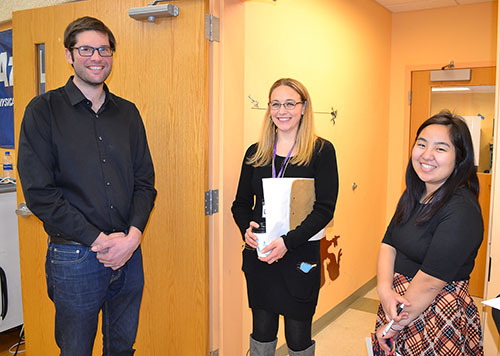
NGS Middle school/junior high science teacher, Bryant Fritz and primary science teachers Ashley Kozak and Stacie Nakamura enjoy the fair.
While NGS Primary Science Teacher Nakamura recognizes that encountering challenges can be difficult and she doesn’t necessarily want her students to go through that, she also acknowledges that students need to understand that that’s part of doing a science fair project, and it's a good learning experience for them.
“That's going to happen…what can you do?”
She underscores that that’s why the future plans section of a student’s presentation is so important.
“They're able to say, ‘This is what I would do next time, and hopefully, maybe I'll see different results. So I think that's always a really awesome part that we have in our presentations to where the students can reflect on what didn't go well, what could I do better next time, or how could I improve, expand upon this project for the next year.”
Might any of their students want to expand on this year’s project next year? Nakamura believes if they were to continue the global issues emphasis next year, a lot of students would go, “‘Ooh, I learned this about pollution,’ or ‘I learned this about water quality,’ and say, ‘Next time I'd want to try this different kind of filter or this different project that has to do with that global issue.’
Woller is looking even further down the road in terms of the benefits of pitfalls students encounter during the process: “We've had a lot of students say, ‘Oh, it didn't work how we expected!’ And even getting to see that, I think, is really encouraging. We've been telling them, ‘That's normal. That's going to happen if you're a scientist, if you're an engineer in the future.’”
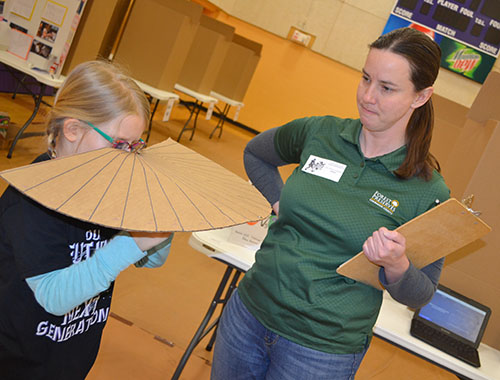
Stacey Clements, the Champaign County Forest Preserve's Education Program Specialist, watches as an NGS student demonstrates the prototype she designed for her project.
More: 6-8 Outreach, K-6 Outreach, Next Generation School, Science Fair, 2020
For additional I-STEM articles highlighting Next Generation School's partnership with the University of Illinois, see the following:
- Next Generation School’s New-Look Science and Engineering Fair Imparts the Same Old In-Depth Learning and Life-Long Skills (2019)
- Students Hone Their Research Skills, Learn From Experts at NGS's 2018 Science & Engineering Fair
- At NGS' Science & Engineering Fair 2017, Every Student Is a Winner!
- 2016 NGS Science & Engineering Fair Fosters Research/Presenting to Experts
- 2015 NGS Science & Engineering Fair Called the "Most Successful" Ever
- Next Generation School's Science and Engineering Fair: Every Student Is a Winner
- Next Generation School Fair: Tomorrow's Scientists & Engineers Meet Today's
- Local Teacher Uses Project Lead the Way to Prepare Next Generation of Engineers
- MechSE Gives Back to the Community
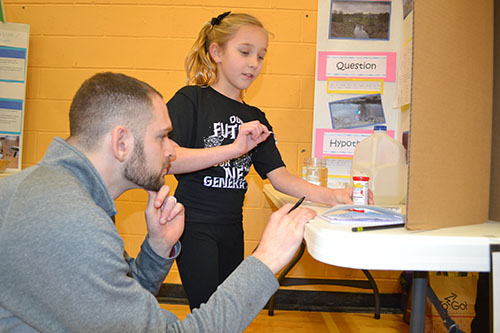
Scott Blanck, a teacher at Next Generation School's STEAM Studio after-school program watches a student do a ph test as part of her presentation at the Science and Engineering Fair.
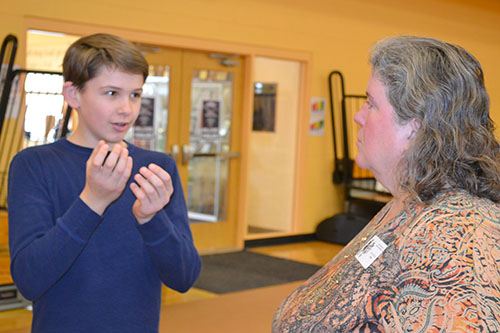
A Next Generation student explains his research to Lesley Deem, Program Manager of Illinois' Pollinatarium.
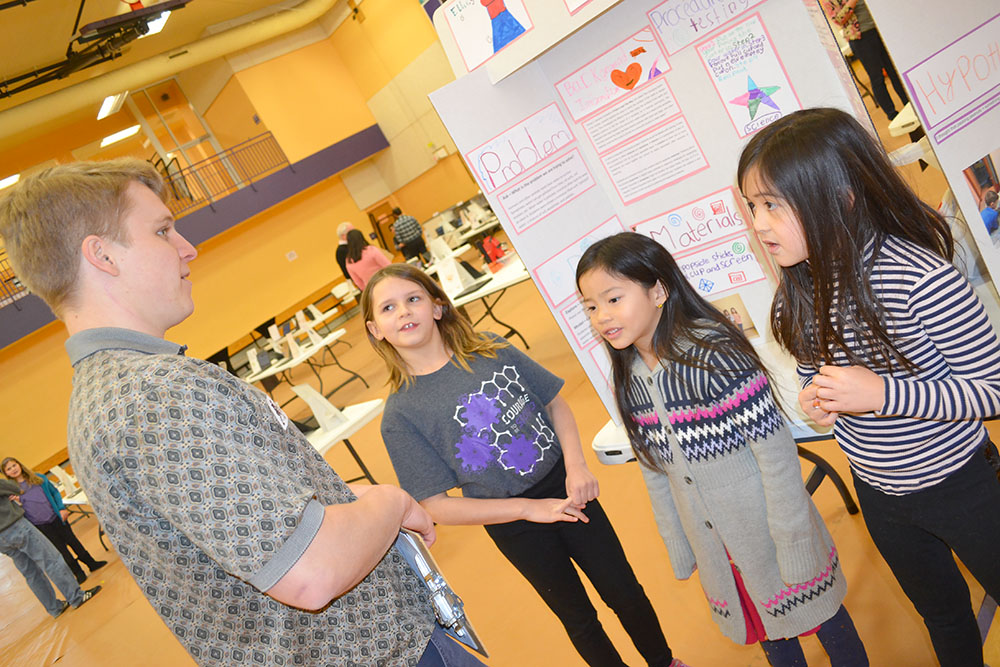
A team of NGS primary students present their research to Illinois biochemist Maxwell Baymiller.













.jpg)
















